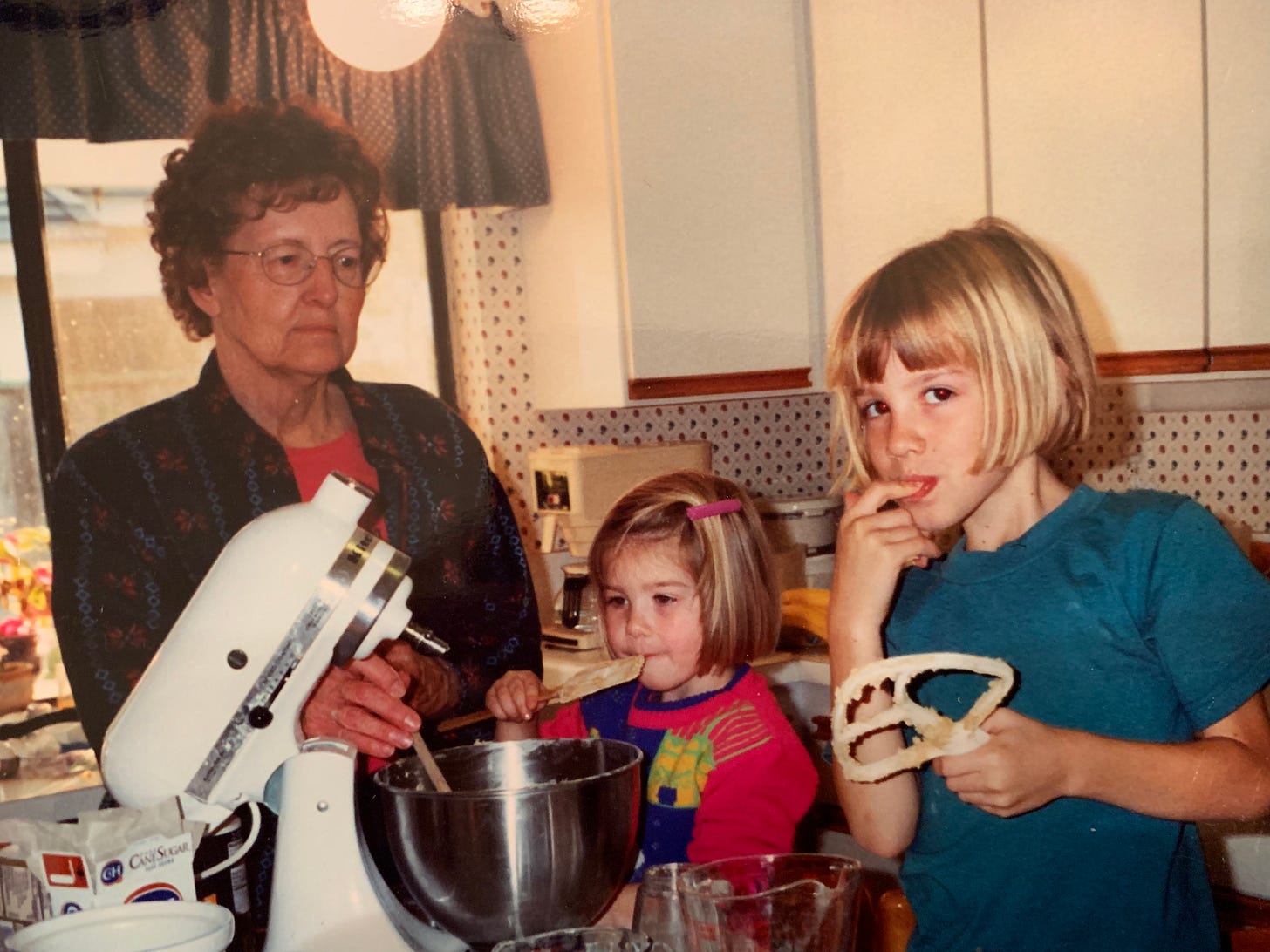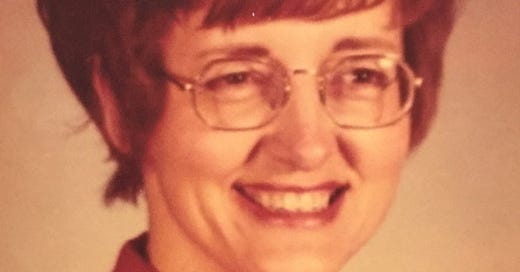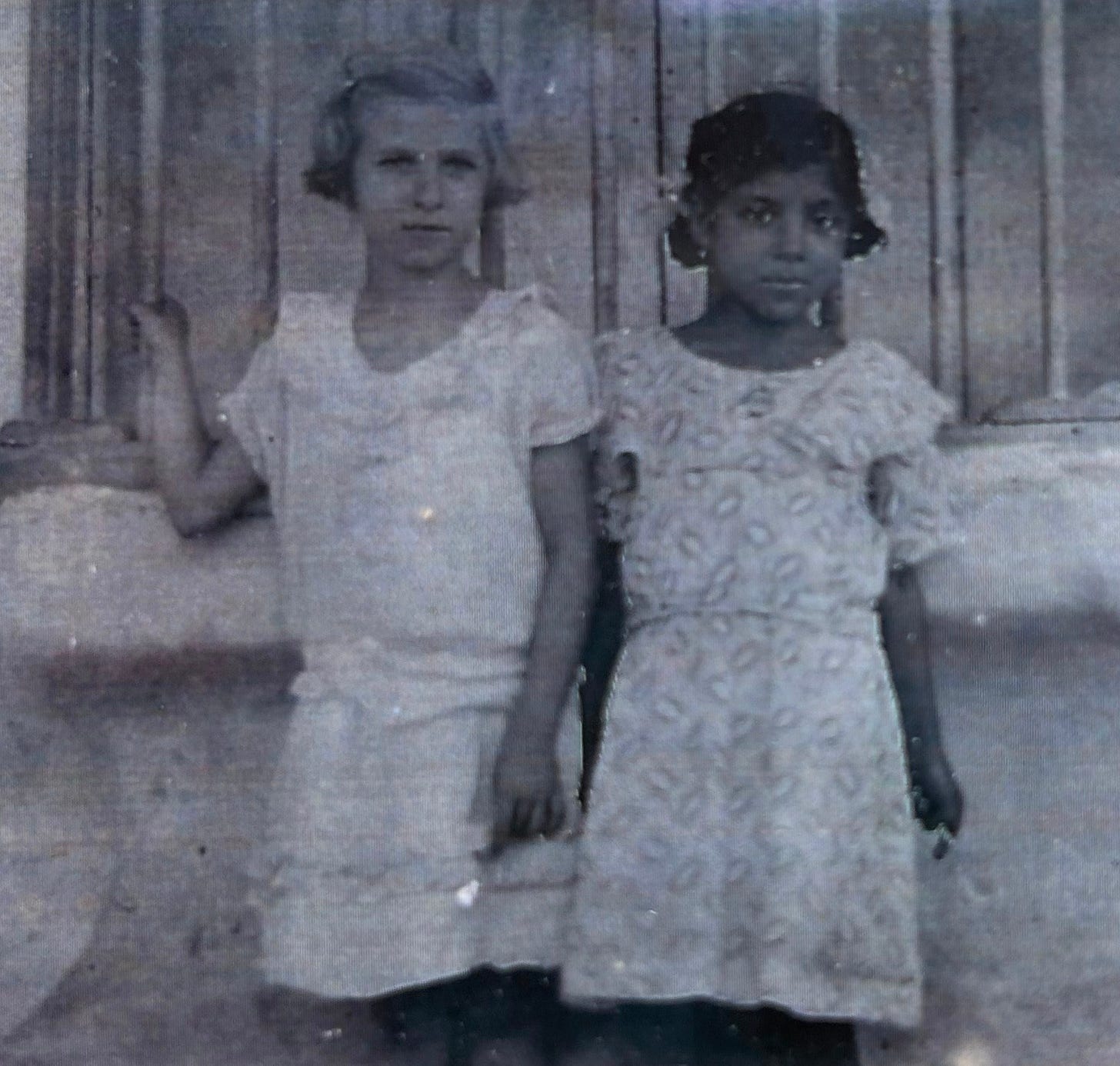When we talk about inheritance, we typically are referring to property, money, a cherished heirloom. But what about instinct? The way you scramble your eggs, or rock a baby to sleep, or fold your bath towels?
Across generations, domestic knowledge is often passed quietly, especially through the maternal line. Anthropologists call it matrilineal transmission: the slow, subtle passing of stories, habits, and rhythms from mother to daughter to granddaughter.
These aren’t things that someone sits you down to explain, they’re things you absorb through observation, consciously or not. We watch, we internalize, we imitate. And then one day, you find yourself patting a baby’s back in the exact same way your grandmother did, or slicing a peach the way your aunt does, or navigating an iron around a collar the same way your mother does.
I’ve been thinking about this a lot lately—how the women in my family who came before me have shaped the way I understand home. Subtle ways, like preferring salted butter to unsalted butter, mastering the art of peeling a mango, tucking potpourri sachets into linen drawers. Lullabies, storytelling, senses of style. The way they hosted dinner parties, or welcomed overnight guests.
This series is a way of beginning to trace those legacies. Today, in Part 1, I’ll share some of my own domestic lineage—memories of my mother and grandmothers. In Part 2, I’ll explore the stories my mother carries about her mother and grandmothers. And in Part 3, I’ll open the floor to you—to the memories and rituals passed down in your own families.
Maybe what you inherited was an irresistible dumpling recipe, or clairvoyance, or a truly superior method for folding a fitted sheet. No matter how significant, these legacies matter because they remind us where we come from. And sometimes, I’m learning, they’re how we find our way home.
My Mother, Through My Eyes
I remember the fuzzy, whirring sound of the wall furnace in the blue dark, clicking and plinking to life as I curled up in front of it, sleepily hugging my knees to my chest. On winter mornings, my Mom would have risen early, gathered our school clothes and popped them into the dryer for a spin. More often than not, they’d be laid out warm next to the furnace in the family room for us, where we would strip out of our pajamas as quickly as possible and shrug into a version of jeans and a sweatshirt, still cozy and static from their daybreak whirl-about.
Until middle school, when I first experienced dinner at friends’ houses, I had thought everyone’s mother made a multiple course meal (with dessert!) for dinner. My Mom had (and has) an extraordinary command of the kitchen, a know-how in her sinews about what makes food taste good, what pairs with what, what can be store-bought (sometimes it’s not fine), and what needs to be made by hand. Dinners, desserts, salads; any cuisine—her expertise is a gift that took me years to realize. I’ve spent much of my adult life in the kitchen myself, calling her from a cloud of steam in front of my stove around 4:30 pm for a tip on seasoning, or to ask which herbs would taste best with a particular squash, or cut of meat, or sauce.
When I think of my Mom in her essence, she is in the kitchen, nose scrunched and laughing at something one of her four daughters has said. She is wearing an apron, and her caramel-streaked hair is secured under a thin, glossy headband. Her kitchen smells like sautéed onion, and a bowl of chocolate chip cookie dough is tucked in the corner under a loose sheet of saran wrap.

My Maternal Grandmother, Through My Eyes
My maternal grandmother was (and is, somewhere in the great beyond) named Veda. For a midwestern woman with Anglo-Saxon origins, no one is quite sure how she ended up with a Sanskrit name. A schoolteacher by trade, I knew her as a polished, color-coordinated matron well aware of her season—a “winter” sporting jewel tones and a bright lip at all times.
I can smell her soap and feel the softness of her hands when I close my eyes. I hear her earrings jangle as she tells a story with her manicured hands, golden elastic wristwatch waving through the air. Her home felt like a gentle afternoon nap where you didn’t miss out on anything; like the magic would still be there when you woke up. Days spent at my grandparents’ home dripped by like a sweating pitcher of lemonade, sweet and sunny.

My sisters and I would have occasional sleepovers at their house, which lucky for us was less than a ten minute drive from ours. I remember one night, not being able to sleep, padding out to their family room, where one midcentury glider and one chenille blue overstuffed rocking chair nodded side by side. My Grandpa, whom I also adored, dozed in his chair as Pat Sajak flashed across the room. My Grandma set down her romance novel of the week and welcomed me onto her lap. She held me as we rocked back and forth, back and forth. I drifted off to sleep again.
In college and the years that followed, my Grandma and I were pen pals. I came across her letters recently, and noticed how her cursive became increasingly shaky over our correspondences. I don’t think I knew at the time how precious those pieces of paper would be to me once she had moved on from this plane.
My Paternal Grandmother, Through My Eyes
My paternal grandmother, Elda, was a legend long before she passed at 102 years old in 2016. Born and raised in Huimanguillo, Mexico, she moved to California at sixteen years old speaking only Spanish. She felt the disorientation of arriving in her parents’ homeland for the first time, feeling Mexican by upbringing, but not by blood.
I knew her only as a widow, and mostly when she would come to live with us for a month or so a few times a year. A phenomenal storyteller with a mischievous streak and no schedule to adhere to, she was the perfect companion for a young child. She’d walk her fingertips along my arm, reenacting stories from her childhood about pet monkeys and a turtle who bit (and would not let go of) her little brother’s finger.
When she wasn’t storytelling, she was drinking her beverage of choice, Pepsi, and watching The Young and The Restless, her armchair positioned three feet away from our family television. But she was far from sedentary—she was known to strap a leaf blower over her shoulder well into her eighties to clear our patio of eucalyptus leaves, and would crochet endless afghans, potholders, and then dish rags once her eyesight began to fail. As kids, we were always suspicious of the glaucoma, because she’d point to the tiniest speck on the floor and tell us to pick it up. How can Grandma see that if she’s blind?

Some of my favorite memories of my Grandma Rippy are the nights we made caramel popcorn together in the kitchen. She’d perfected the recipe, and the very best part of the process was scooping gooey clumps out of the hot pots and into brown paper grocery bags, which we’d then tear open and spread out wide across the kitchen island to cool. It was fun, and sticky, and physical, more like play than baking.
Whenever I draw her face into my mind’s eye, she’s always smiling, a knowing twinkle in her blue eyes.
My matriarchs’ lives are stitched into mine in everyday ways. I know them intimately, not only through stories, but through the things I find myself doing now without thinking. They were, and are, the quiet architects of my instincts. And in that way, they’ll always be with me.
I’d love to hear your matriarchal memories—email eatwarmbread@gmail.com to share stories of your own to be featured in Part 3!








